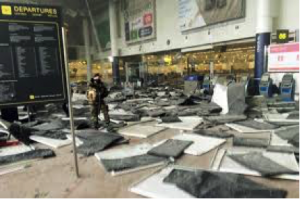 On Tuesday, March 22, the blind terror of Islamic State sent shock waves through Brussels, and far beyond. Terrorist bomb attacks, one in Brussels Airport
and another one in the Maalbeek metro station, near the EU buildings, caused at least 31 deaths and 250 injured, many of them seriously. Baggage handlers
at the airport, train personnel at the metro, travellers and commuters, common people from all walks of life, individuals and families from different
nationalities, convictions and origins are among the victims.
On Tuesday, March 22, the blind terror of Islamic State sent shock waves through Brussels, and far beyond. Terrorist bomb attacks, one in Brussels Airport
and another one in the Maalbeek metro station, near the EU buildings, caused at least 31 deaths and 250 injured, many of them seriously. Baggage handlers
at the airport, train personnel at the metro, travellers and commuters, common people from all walks of life, individuals and families from different
nationalities, convictions and origins are among the victims.
“Their lives have been taken away by barbaric fanatics”, said Peter Mertens, Chairman of the PTB (Workers’ Party of Belgium) in a first reaction. “There are no excuses whatsoever for these cowardly acts of terror, aimed at destroying our living together. The IS terrorists want to impose their world view of mutual hatred, increasing division, more militarisation and new wars. But they won’t succeed. Because solidarity and resilience stand in their way. As in the touching case of Alphonse Youla, the black baggage handler who helped six or seven people escape the nightmare at Brussels Airport. As in the thousands of messages on social media with the hashtag #Iwanttohelp: people offering a ride out of Brussels, a place to spend the night or donating blood. The very day of the attacks, hundreds of people spontaneously gathered at Brussels’ central Bourse Place, where Iraqi oud player Hossein sang a song of hope.”
Dirk De Block, PTB Brussels Chairman, and Youssef Handichi, member of the Brussels Parliament for the PTB and himself a former bus driver and trade-unionist, immediately tweeted: “We won’t let those cowards destroy what we have built together”, thus expressing a widely held sentiment among the Brussels population. In Brussels and in many other cities throughout Belgium, these days several solidarity vigils, marches and assemblies are being held, in which the PTB takes an active part.
But today we also have to ask many questions, and many answers will need to be provided. Since the Paris attacks last November, people in Brussels have had to cope with heavily armed military in the streets. They now come to the conclusion that these have certainly not helped to avoid terror attacks. The authorities have been blaming entire communities as hotbeds of terrorism that needed a thorough “cleaning up”, thus putting their inhabitants’ democratic rights at stake, instead of using specific and selective measures aimed at precise terrorists and their network. Other issues come to the fore with even more force than before the Brussels attacks. How to tackle racism and exclusion, discrimination and inequality, while stimulating and enhancing the people’s unity and resistance against the government’s anti-austerity measures? How to promote a just and lasting peace in the Middle East and particularly in Syria, through dialogue and negotiations with all local and regional actors involved, instead of taking the military option and adding more bombs and destruction? How to efficiently combat IS and its ultra-reactionary ideology, if not by taking on the financial and logistical support it continues to get via Saudi-Arabia, the Gulf States and Turkey – all NATO allies? For in the medium term, it is only by tackling the root causes that we will be able to effectively counter terror and war, hate and division, racism and exclusion.
Comments are closed, but trackbacks and pingbacks are open.